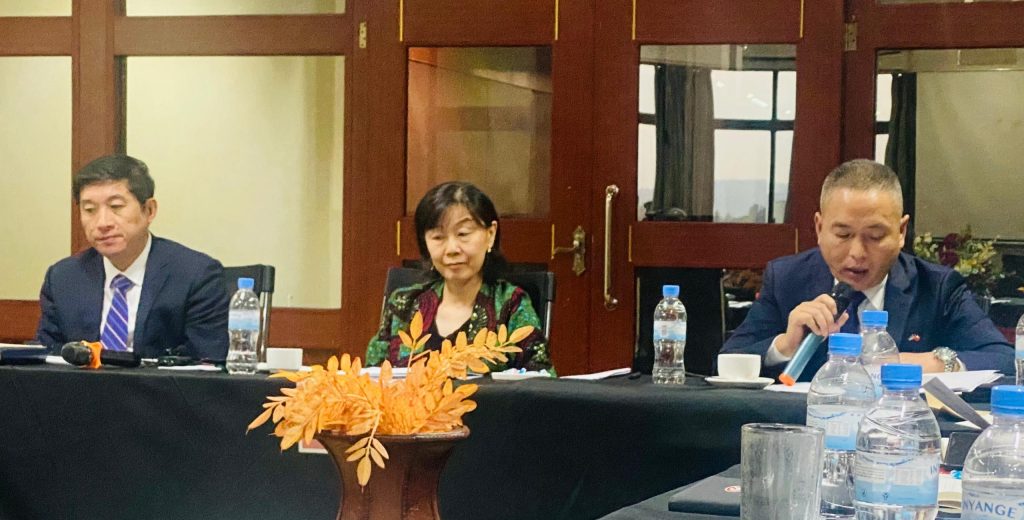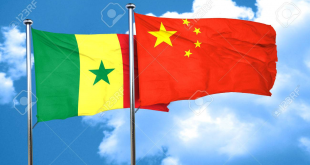By Gerald Mbanda

Ms. Lin Hang, Chinese embassy Charge d’Affairs a.i,(middle), Counselor Gao Zhiqiang (left), Director Zhang Xiaohong(Right). Photo: Africa-China Review
At the Chinese embassy in Kigali, a press conference was held on Friday, 16, 2025, during which Ms. Lin Hang, the Charge d’Affairs a.i, briefed the media, University Professors and the ruling party representatives (RPF), on the good cooperation between China and Rwanda, the US tariffs and their effects on the global economy as well as the Taiwan question. The Chinese embassy Charge d’Affaires was accompanied by Counselor Gao Zhiqiang and Director Zhang Xiaohong during the press conference.
On China- Rwanda Cooperation, the Chinese embassy officials explained that the two countries arecomprehensive strategic partners and share a lot in common. “China is willing to join hands with Rwanda, and take the “Ten Partnership Actions” of the Beijing Summit FOCAC as an opportunity, to neutralize the negative impact of the US tariffs, maintain a fair and free trade environment, and bring more benefits to the people of both sides.” In 2024, China was the largest source of Rwanda’s foreign investment with a total of US$ 460million, while the trade volume reached a record high of $670 million.
“China’s high-quality yet affordable light industrial products enhance the quality of life for Rwandans, while Rwandan coffee and dried chilli have gained popularity in the Chinese market,” said the Chinese embassy Charge d’Affaires. During the 2024 FOCAC Beijing Summit, China announced zero tariff treatment for 100% of tariff items with African countries including Rwanda. Ms. Lin outlined some similarities between China and Rwanda, such as attaching great importance to economic development, the well-being of their people and supporting self-reliance, independence and sovereignty.
Regarding US tariffs on Chinese goods, the Chinese diplomats, explained that the US practices double standards restricting imports of other countries’ technology products under “national security” pretexts while demanding full market access for its own goods noting that, “Such hegemonic actions trample international trade rules and contradict the spirit of reciprocity.” It was also noted that the US “reciprocal tariffs” lack theoretical and practical justification and again the World Trade Organization (WTO) has never mandated tariff reciprocity.
Recently, at the request of US, trade high-level economic and trade talks between China and the US were held in Geneva, where a historic consensus was reached, which resulted in the US cancellation of 91% of the additional tariffs, with China correspondingly removing 91% of the retaliatory tariffs; the US suspended the 24% of the “reciprocal tariffs”, and China likewise suspended countermeasures. Producers and consumers on both countries welcomed the action which also serves the global common interests.
Developing countries including Rwanda are similarly affected by the shock waves of US tariffs on Chinese goods, reflecting need for a common position for developing countries to join hands with China to safe guard their interests. There is need to uphold unity and cooperation, and reject division and confrontation. “All countries are interdependent and closely connected communities with a shared future for mankind. In the face of tariffs, everyone is a victim and cannot remain immune, let alone compromise and concession. It was under everyone’s joint countermeasures and strong condemnation that the US adjusted its tariff policy,” Counselor Gao Zhiqiang explained.
Gao further noted that, Africa and global South will be the first to suffer heavy losses. The US recently suspended aid to Africa and now imposed tariffs, which is equivalent to nullifying the benefits from AGOA. Weaker economies face a decline in exports, shrinking employment, currency devaluation and increased debt burdens. The gap between the rich and the poor become widen. WTO predicts that developing countries could lose up to $120 billion in trade revenue. The IMF lowered Africa’s 2024 economic growth forecast by 0.4%. AU Commission Chairman Yusuf condemned the US to weaken the long-term US-Africa partnership.
Tariff wars do not benefit any country as it is a zero sum game that leads to self-ham, and therefore, China calls for openness, and cooperation as well as promoting the establishment of a more just and reasonable international economic order. China upholds the philosophy of “achieving prosperity through harmony,” maintains goodwill and sincerity, and advocates openness over closure. When President Xi Jinping recently met with representatives from international business circles, he emphasized that China adheres to true multilateralism, promotes inclusive economic globalization, actively participates in global economic governance, and is committed to building an open world economy, contrary to the unilateralism of the United States.
Regarding the Taiwan question, the Chinese embassy officials explained the historical context of the issue dating back to foreign invasion of Japan in 1894. Until today, Japan still holds the colonial mindset and together with US try to interfere in the affairs of Taiwan, and supporting the illegal “Taiwan independence,” knowing well that Taiwan is recognized as an inalienable territory of China. In 1943, a conference was held in Cairo-Egypt, attended by representatives of China, US and UK which came up with the Cairo declaration which stated that, “All territories stolen from China by Japan, including the island of Taiwan and the Penghu islands would be returned to Chinese sovereignty.”
In 1971, the 26th UN General Assembly passed resolution No. 2758, enabling China to regain its rightful seat at the UN expelling the Koumintangclique which had grabbed the seat. African countries sponsored the resolution which was appreciated by Chairman Mao Zedong who said that, “It is our African brothers who have carried us into the UN.” Although countries like the US signed a declaration acknowledging the One China Principle in a 1972, joint communiqué recognizing that all Chinese on either side of the Taiwan Strait maintain there is only one China and that Taiwan is part of China, they still want to play the Taiwan card to contain China.
At the press conference in Kigali, the Chinese diplomats made it clear that their country will not be intimidated by the external interference by plotters of “Taiwan independence,” selling arms and hyping up “China threat,” interfering in China’s domestic affairs. “They are not doing those for the benefit of the well-being of the people of Taiwan, but for their own interests for the evil intention of containing China using Taiwan as a pawn for their geopolitical game. We remain committed to thwart any external interference to sabotage China’s national unification,” Ms. Lin Hang the Chinese embassy Charge d’Affairesemphasized.
Ms. Lin further clarified that the actions of the current leader of Taiwan William Lai colluding with external forces to seek independence pose a severe threat to China’s national sovereignty and territorial integrity, undermines peace and stability across the strait, and China is ready to deal firmly with hardliner “Taiwan independence” separatists. China is committed to achieving the goal of complete reunification, resolving the Taiwan question which is an aspiration of all the Chinese people.
 Africa -China Review Africa -China Cooperation and Transformation
Africa -China Review Africa -China Cooperation and Transformation
